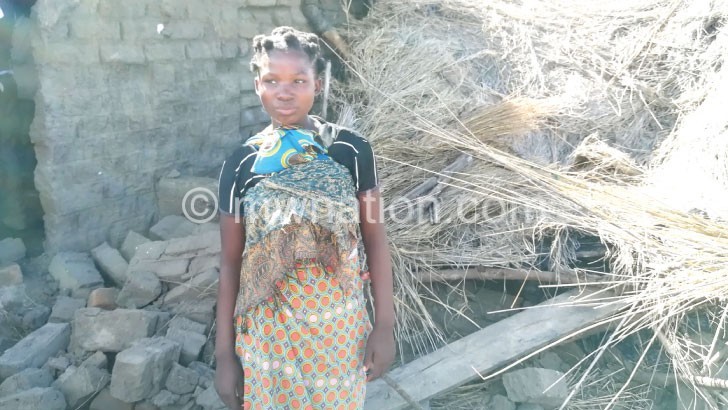When misfortunes strike
When floods ripped her home to rubble, Fanny Kamoto and her four children were grappling with hunger.
The 18-year-old vividly recalls the tragedy that struck the rural territory of Traditional Authority (T/A) Nkanda, Mulanje North, six months after her husband had migrated to Mozambique “without saying goodbye”.
She recounts: “For days, we were surviving on porridge, mangoes and vegetables.

“Then my house crumbled and the maize field was washed away. Without a husband to reconstruct the house and buy food, the world had turned against me.”
Kamoto is among nearly 3 800 people faced by the misfortune which affected about 690 households last month.
The locals in the low-lying strip between Namadzi and Phalombe rivers remember the downpour which started on December 9 and persisted for 16 days.
The floods roared with the fury of death on December 23, they say.
“That Sunday, nobody saw the sunrise. Darkness descended upon us. Around 9am, merciless torrents started battering the ground. By 4pm, houses were collapsing due to floods and strong winds,” recalls Symon Phiri, 42, from Nsamila Village.
Kamoto successfully saved her children from a crumbling house.
“I grabbed them and pushed them outside into the open. We were safer outside,” she says.
Outside she was joined by neighbours fleeing from falling homes.
“We run to an anthill where we stood, watching the flood destroying homes and crops,” she says.
Kamoto now sleeps in a poultry house while the children are putting up in her father’s residence.
Her displacement mirrors the hardship faced by thousands hit hard by flash floods and hailstorms across the country.
According to the Department of Disaster Management Affairs, (Dodma)), floods and rainstorms have affected 20 763 households in Balaka, Salima, Mangochi, Mchinji, Nsanje, Machinga and Chikwawa.
Maulana Jawadu, from T/A Kalembo, Balaka also watched helplessly when his house fell amid torrents last month.
Now, he is staying in a neighbour’s house.
“It will take me a lot of money to build another house in the face of this hunger. Every coin goes towards buying food,” he says.
The flood survivors in all the districts share the same fate—the tragedy worsened by hunger and poverty.
According to Malawi Vulnerability Assessment Committee (Mvac), almost 3.3 million people in the country are food insecure due to drought and fall armyworms which ravaged maize fields last year.
“We ran out of food in April last year. We had directed our energies to finding food, but now this misfortune presents a new challenge,” he laments.
In Balaka and Mangochi districts, the floods in December displaced 356 and 128 households respectively in T/As Kalembo and Mponda. This happened barely a month after a rainstorm blew off the rooftops of 200 houses in Katuli, Chowe, Chilipa and Makanjira.
In Karonga, floods rendered 241 households homeless since the rains started last November.
The natural disasters have killed 17 people, with four deaths caused by floods.
According to the Meteorological Department, the likelihood of more floods is high.
Reads the weather alert of December 23: “The expected rains and locally heavy downpours are likely to cause flash floods as river flooding as a result of swelling of rivers due to siltation worsened by environmental degradation as soil is already very wet in most parts of the country and poor drainage system, particularly in cities and towns.”
Minister of Homeland Security Nicholas Dausi, who heads Dodma, calls the confluence of hunger and rain-related catastrophes a double tragedy.
Government has set aside K68.5 billion for food security response for this growing season he said.
“There will be more flooding this year, mostly because of climate change. We urge people to build resilience. Government is ready to help people, we want to make sure that no one dies of hunger,” he says.
For two months, Dodma has been distributing maize, beans, buckets, plastic sheeting and other relief items to those affected by natural disasters.
However, poor survivors, such as Kamoto, will take long to reconstruct their homes and livelihoods.





